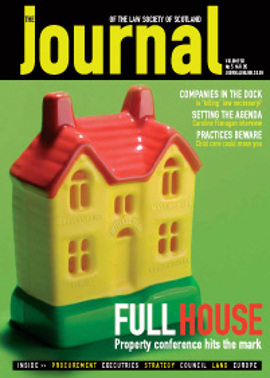Book reviews

AUTHOR: ROBERT RENNIE
PUBLISHER: W GREEN
ISBN: 0 414 01548 7
PRICE: £95
By anyone’s standards, the legislative changes introduced in the past few years to reform the land law of Scotland have been significant. The abolition of the feudal system of tenure was a mammoth task co-ordinated in an exceptionally able manner by the Scottish Law Commission. The effects on the practice of conveyancing are still being felt and are likely to continue for a few years to come as the profession gets to grips with the root and branch nature of the reforms. During that period, it is tools like this one that they should turn to.
This is an excellent review of the background to the various reforms and a detailed analysis of each piece of legislation. As well as the triumvirate of the Abolition of Feudal Tenure (Scotland) Act 2000, the Title Conditions (Scotland) Act 2003 and the Tenements (Scotland) Act 2004 (then a bill at the date of publication), there is also a review of the Land Reform Act 2003. There is, quite simply, something for everyone.
The short numbered paragraphs, ably supported by succinct footnotes, make it easy for the reader to navigate one’s way through the text. If looking for a specific matter only, the comprehensive contents pages and index are of great assistance.
Commentary on legislative provisions can be somewhat dry. Not in this case, however, where statutory provisions are placed in context and then subjected to critical analysis. The use of humour, on occasion, in the practical case studies in the text is well done and allows the reader almost to hear the author in full flow as he describes “Stuart the Alsatian eating Roddy the hamster” – cf paragraph 9.22 as an example of extinction by acquiescence.
The book contains a good analysis of ius quaesitum tertio and sets the law against the reality of the fact that most practitioners have, over the years, tended to overlook the necessity on occasion of obtaining the consent of a third party – see paragraph 1.12.
The section on baronial and noble titles (paragraph 2.05) is also very useful – especially given the creation of the private Register of Baronies, which was not in operation when the book was published.
The author is critical on occasion of the lack of important statutory definitions: for example the absence of a definition of “common scheme” in either section 25 or sections 52-54 of the Title Conditions (Scotland) Act, and the fact that there is no definition of “substantially completed” in section 16 of the same Act.
The sections on enforcement of real burdens (chapter 8) and variation and discharge of real burdens (chapter 9) are clearly written with good use of practical examples. The lighthearted look at quite complex matters such as the service of a notice of termination (aka “serving an Arnold”) in the form contained in schedule 2 to the Title Conditions Act (section 20(1)) ensures that the reader’s focus is maintained.
One of the benefits of this book however is the analysis of all of the important statutes in the same text. It is good to see the important subject matter of the Land Reform Act being dealt with alongside the other legislative reforms. This is all against the backdrop of chapter 16, which explains the importance of human rights to statutes of the Scottish Parliament.
There are one or two minor typographical and other errors in the text, but these in no way detract from the excellence of this book. Indeed it seems churlish even to make this reference. Robert Rennie should be congratulated by the profession for writing so clearly on such a comprehensive subject. I am sure that even the “expensive East Coast Solicitor, Roderick Reid-Brymer Von Gretton” (see paragraph 8.24) will have no difficulty following the text!
Stewart Brymer, Partner, Thorntons Law LLP
In this issue
- Leaving on a high
- The JAB: why it isn't working
- One house, many rooms
- Bad company
- Tender and true
- Beware the pitfalls
- Alien investors in the US
- Budgeting and beyond
- Let's play tag
- Same old story
- Getting the message across
- Council life
- Should the party pay?
- Unintended effects?
- A fine Profile
- Public benefit?
- The appeal of leave
- When is a cost not an expense?
- Website reviews
- Book reviews
- What a waste!
- How safe are your titles?






